DigCCurr 2013 Doctoral Symposium Participants
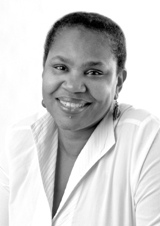 Celeste Â-Re
is a first year doctoral student at the University of South Carolina School of Library and
Information Science, specializing in Cultural Heritage Informatics. She received her M.S. in
Library Information Science from Long Island University in 2006. Her research interests revolve
around transdisciplinary approaches to critical heritage studies and critical race information
theory as applied to public history and cultural arts digital curation. She is currently on
sabbatical from the Library of Congress National Audio-Visual Conservation Center where she will
return, in the fall, to work as a recorded sound processing technician while completing doctoral
studies. At the Library of Congress she collaborated on the National Jukebox historical
recordings web streaming project and contributed to the finding aid for audio documentarian, Tony
Schwartz. Over the years, Â-Re has served as a cultural arts manager in a variety of
capacities: director of operations for the Virginia Arts Festival, a multi-city, cultural tourism
event; technical director for Urban Bush Women, a community engagement, performance ensemble;
production manager for Ronald K. Brown/EVIDENCE, a dance company integrating Africana diasporic
corporeality with historiography, and producer of Sassitude and She-Funk, Pacifica Radio special
programming for International Working Women’s Day.
Celeste Â-Re
is a first year doctoral student at the University of South Carolina School of Library and
Information Science, specializing in Cultural Heritage Informatics. She received her M.S. in
Library Information Science from Long Island University in 2006. Her research interests revolve
around transdisciplinary approaches to critical heritage studies and critical race information
theory as applied to public history and cultural arts digital curation. She is currently on
sabbatical from the Library of Congress National Audio-Visual Conservation Center where she will
return, in the fall, to work as a recorded sound processing technician while completing doctoral
studies. At the Library of Congress she collaborated on the National Jukebox historical
recordings web streaming project and contributed to the finding aid for audio documentarian, Tony
Schwartz. Over the years, Â-Re has served as a cultural arts manager in a variety of
capacities: director of operations for the Virginia Arts Festival, a multi-city, cultural tourism
event; technical director for Urban Bush Women, a community engagement, performance ensemble;
production manager for Ronald K. Brown/EVIDENCE, a dance company integrating Africana diasporic
corporeality with historiography, and producer of Sassitude and She-Funk, Pacifica Radio special
programming for International Working Women’s Day.  Heather Barnes is currently a third-year doctoral
student and DigCCurr Fellow at the University of North Carolina at Chapel Hill's School of
Information and Library Science. Her research interests focus primarily on organizational and
cultural memory practices, particularly those of the performing arts communities. Research projects
include work on documenting the organizational memory of film festivals and on the personal
information management strategies of independent documentary filmmakers. As a graduate student, she
has worked with various digital archives projects including Folkstreams, a documentary film
digitization and preservation project. She has become increasingly interested in the relationships
between film archives and cultural phenomena such as festivals and performances, and in models for
preservation and information management within community arts organizations.
Heather Barnes is currently a third-year doctoral
student and DigCCurr Fellow at the University of North Carolina at Chapel Hill's School of
Information and Library Science. Her research interests focus primarily on organizational and
cultural memory practices, particularly those of the performing arts communities. Research projects
include work on documenting the organizational memory of film festivals and on the personal
information management strategies of independent documentary filmmakers. As a graduate student, she
has worked with various digital archives projects including Folkstreams, a documentary film
digitization and preservation project. She has become increasingly interested in the relationships
between film archives and cultural phenomena such as festivals and performances, and in models for
preservation and information management within community arts organizations. 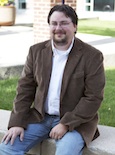 Edward Benoit, III is a
doctoral candidate in the School of Information Studies at the University of Wisconsin-Milwaukee
with a major in information retrieval and a minor in archives. His research focuses on digital
collections; specifically increasing access to information through digital libraries and archives.
He holds both an MLIS and MA-History from UW-Milwaukee, and has worked at the National Baseball Hall
of Fame, the Milwaukee Art Museum, and the Waukesha County Historical Society.
Edward Benoit, III is a
doctoral candidate in the School of Information Studies at the University of Wisconsin-Milwaukee
with a major in information retrieval and a minor in archives. His research focuses on digital
collections; specifically increasing access to information through digital libraries and archives.
He holds both an MLIS and MA-History from UW-Milwaukee, and has worked at the National Baseball Hall
of Fame, the Milwaukee Art Museum, and the Waukesha County Historical Society. Thu-Mai Christian is a Ph.D. student at the School of Information and Library Science at the University of North Carolina at Chapel Hill. Her research explores policies, services, and infrastructures that support data stewardship, with consideration to researchers' needs and established practices in their respective domains. She is also the archival research associate at the Odum Institute for Research in Social Science, providing data archives services to faculty on the UNC campus and beyond.
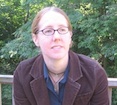 Patricia Condon is a
doctoral candidate in the Graduate School of Library and Information Science at Simmons College,
Boston. She received her Master of Library and Information Science and Master of Arts in
Anthropology from The University of Southern Mississippi. Patti has more than ten years
experience working in archives and academic and special libraries. Patti’s dissertation
research investigates the disciplinary status of digital curation – the study asks whether
digital curation exists as a set of practices or is emerging as a distinct discipline.
Patti’s other research interests include community archives, cultural heritage, and
memory (with particular focus on the role of personal narratives and sense of place); preservation
and access of library and archival print and digital materials; archival research trends and
methodologies; and library and archival education. As an educator, Patti encourages her students to
develop and improve their research and practical skills through active learning; attain a more
thorough understanding of, and respect for, the theory and history of their field; gain a holistic
view of the information disciplines; and creatively explore new ideas. As a lifelong learner,
Patti strives to do the same.
Patricia Condon is a
doctoral candidate in the Graduate School of Library and Information Science at Simmons College,
Boston. She received her Master of Library and Information Science and Master of Arts in
Anthropology from The University of Southern Mississippi. Patti has more than ten years
experience working in archives and academic and special libraries. Patti’s dissertation
research investigates the disciplinary status of digital curation – the study asks whether
digital curation exists as a set of practices or is emerging as a distinct discipline.
Patti’s other research interests include community archives, cultural heritage, and
memory (with particular focus on the role of personal narratives and sense of place); preservation
and access of library and archival print and digital materials; archival research trends and
methodologies; and library and archival education. As an educator, Patti encourages her students to
develop and improve their research and practical skills through active learning; attain a more
thorough understanding of, and respect for, the theory and history of their field; gain a holistic
view of the information disciplines; and creatively explore new ideas. As a lifelong learner,
Patti strives to do the same.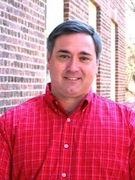 Jonathan Crabtree is Assistant Director of Computing and Archival Research at
the Odum Institute for Research in Social Science at UNC Chapel Hill. As
assistant director, Crabtree completely revamped the institute’s technology
infrastructure and has positioned the institute to assume a leading national role in
information archiving. Crabtree joined the institute nineteen years ago and is
responsible for designing and maintaining the technology infrastructure that
supports the institute’s wide array of services. Before moving to the social
science side of campus he was an information systems technologist for the
University of North Carolina at Chapel Hill School of Medicine. In addition to his
work at the institute he is working part time on a PhD in Information Science at
the UNC School of Information & Library Science.
Jonathan Crabtree is Assistant Director of Computing and Archival Research at
the Odum Institute for Research in Social Science at UNC Chapel Hill. As
assistant director, Crabtree completely revamped the institute’s technology
infrastructure and has positioned the institute to assume a leading national role in
information archiving. Crabtree joined the institute nineteen years ago and is
responsible for designing and maintaining the technology infrastructure that
supports the institute’s wide array of services. Before moving to the social
science side of campus he was an information systems technologist for the
University of North Carolina at Chapel Hill School of Medicine. In addition to his
work at the institute he is working part time on a PhD in Information Science at
the UNC School of Information & Library Science.  Devan Ray Donaldson is a Doctoral Candidate in the School of Information
at the University of Michigan, Ann Arbor. He conducts research in the areas of Digital Preservation
and Curation focusing on Preservation Management, Preservation Metadata, Preservation Repositories,
Trustworthiness, and End-Users. Recent publications include “Secondary Adoption of Technology
Standards: The Case of PREMIS” with Elizabeth Yakel in Archival Science (in press),
“Provenance and Credibility in Scientific Data Repositories” with Kathleen Fear in
Archival Science (Vol. 12, No. 3), ‘‘Users’ Trust in Trusted Digital Repository
Content’’ in the proceedings of the 8th International Conference on the Preservation of
Digital Objects (iPres 2011), and ‘‘Implementing PREMIS: A Case Study of the Florida
Digital Archive’’ with Paul Conway in Library Hi Tech (Vol. 28, No. 2). Donaldson has
been a Bill and Melinda Gates Millennium Scholar since 2002, a Horace H. Rackham Merit Fellow since
2008, and an Edward Alexander Bouchet Graduate Honor Society Member since 2012. He earned a M.S. in
Library Science from the University of North Carolina and a B.A. in History from the College of
William and Mary in Virginia.
Devan Ray Donaldson is a Doctoral Candidate in the School of Information
at the University of Michigan, Ann Arbor. He conducts research in the areas of Digital Preservation
and Curation focusing on Preservation Management, Preservation Metadata, Preservation Repositories,
Trustworthiness, and End-Users. Recent publications include “Secondary Adoption of Technology
Standards: The Case of PREMIS” with Elizabeth Yakel in Archival Science (in press),
“Provenance and Credibility in Scientific Data Repositories” with Kathleen Fear in
Archival Science (Vol. 12, No. 3), ‘‘Users’ Trust in Trusted Digital Repository
Content’’ in the proceedings of the 8th International Conference on the Preservation of
Digital Objects (iPres 2011), and ‘‘Implementing PREMIS: A Case Study of the Florida
Digital Archive’’ with Paul Conway in Library Hi Tech (Vol. 28, No. 2). Donaldson has
been a Bill and Melinda Gates Millennium Scholar since 2002, a Horace H. Rackham Merit Fellow since
2008, and an Edward Alexander Bouchet Graduate Honor Society Member since 2012. He earned a M.S. in
Library Science from the University of North Carolina and a B.A. in History from the College of
William and Mary in Virginia.Jonathan Dorey is a Ph.D. candidate at the McGill University School of Information Studies in Montréal, Canada. His primary fields of study are archival literacy, archives users, and archival education. He is also interested in the relationship between language and information and the development of bilingual and multilingual taxonomies. Jonathan is currently working as a lecturer, teaching a master’s level research methods course, and research assistant, working on bilingual taxonomy development for image retrieval. Previously, Jonathan was part of the Scoping the Published Archival Research Corpus (SPARC) research project and of a joint McGill University and Université de Sherbrooke collaborative project to conceptualize the notion of comfort for enthusiast cyclists through a discourse analysis and in-depth interviews. Jonathan holds an MLIS from McGill University (2010), a graduate certificate in website and software localization from Université de Montréal (2008) and a bachelor’s degree in translation and East-Asian studies from Université de Montréal (2002). He is also a certified translator since 2005
Christa V. Hardy is a Graduate Faculty member for the Master of Archival Studies program at Clayton State University. Previously, she worked as Information Literacy & Learning Assistance Coordinator at Alabama State University. She earned a B.A. in English Literature and an MLS from the University of Alabama and PhD from the University of Illinois. Her research analyzes the impact of ethnicity and gender on defining cultural memory.
 Brianna Marshall is a second year
dual-degree Master of Library Science and Master of Information Science student at Indiana
University’s School of Library and Information Science in Bloomington, IN. She currently works
at the Digital Library Program, the Cyberinfrastructure for Network Science Center, the Kinsey
Institute for Sex, Gender and Reproduction, and the Wells Library Teaching and Learning Department.
She is a 2012-2013 HASTAC scholar and Managing Editor for the blog Hack Library School. Her research
interests include library management and administration, digital libraries and archives, and data
curation and born-digital materials. She blogs at www.briannamarshall.com and tweets occasionally
@notsosternlib.
Brianna Marshall is a second year
dual-degree Master of Library Science and Master of Information Science student at Indiana
University’s School of Library and Information Science in Bloomington, IN. She currently works
at the Digital Library Program, the Cyberinfrastructure for Network Science Center, the Kinsey
Institute for Sex, Gender and Reproduction, and the Wells Library Teaching and Learning Department.
She is a 2012-2013 HASTAC scholar and Managing Editor for the blog Hack Library School. Her research
interests include library management and administration, digital libraries and archives, and data
curation and born-digital materials. She blogs at www.briannamarshall.com and tweets occasionally
@notsosternlib. Felix Monguilot Benzal is an Spanish Art Historian. He is currently the Kress Interpretive Fellow at the National Gallery of Art in Washington, DC. He works for the Department of Italian and Spanish Paintings, where he oversees an educational web project related to the painter El Greco.
Felix arrived at the National Gallery in 2011 as a Ministry of Culture of Spain fellowship recipient. Prior to 2011, Monguilot had been working for several institutions of the Italian art world, both as a researcher and an art project coordinator.
He also has extensive experience as an art docent in museums and other art-related sites. He is now in the final stage of his Ph.D program at the University of Murcia, Spain, as he is completing his doctoral thesis. Felix Monguilot has published and presented widely in a number of different countries and at a variety of institutions.
 Angela Murillo is a third-year doctoral student
at the School of Information and Library Science at the University of North Carolina. She received
her bachelor’s degrees in Geosciences, English, and Spanish and her MLIS (Beta Phi Mu) from
the University of Iowa. During her master’s program she was an IMLS Digital Libraries Research
Fellow. She also worked at Digital Library Services and Special Collections and University Archives.
Some of her research interests include digital curation; scientific data - specifically how
scientists seek and use information, reuse of data and collaboration; social and cultural aspects of
information seeking behavior; and effects of digital environments on globally/multilingual or
underrepresented communities. Her website is: http://amurillo.web.unc.edu.
Angela Murillo is a third-year doctoral student
at the School of Information and Library Science at the University of North Carolina. She received
her bachelor’s degrees in Geosciences, English, and Spanish and her MLIS (Beta Phi Mu) from
the University of Iowa. During her master’s program she was an IMLS Digital Libraries Research
Fellow. She also worked at Digital Library Services and Special Collections and University Archives.
Some of her research interests include digital curation; scientific data - specifically how
scientists seek and use information, reuse of data and collaboration; social and cultural aspects of
information seeking behavior; and effects of digital environments on globally/multilingual or
underrepresented communities. Her website is: http://amurillo.web.unc.edu. Frances Nichols: I am a
newcomer to the field of Archival Studies. My background is mainly in history. I obtained two
undergraduate degrees from the University of Tennessee in History and Classical Civilization, and a
Masters in history from the University of Kentucky. Working in the special collections at the
University of Kentucky changed my direction of study to focus on archiving. I am currently a
first year PhD student at the School of Information Sciences at the University of Tennessee,
with a focus on digitization, digital collections and user access. I am particularly
interested in investigating national and international collaborations that are working to better
construct and maintain archives to better serve the public. My goal is to gain valuable
practice and research experience in the field at a national archive for several years, to achieve a
solid understanding and first-hand experience in the real world opportunities and challenges of
contemporary digital archives, and then to return to the world of academe to teach and prepare
future generations of digital archivists.
Frances Nichols: I am a
newcomer to the field of Archival Studies. My background is mainly in history. I obtained two
undergraduate degrees from the University of Tennessee in History and Classical Civilization, and a
Masters in history from the University of Kentucky. Working in the special collections at the
University of Kentucky changed my direction of study to focus on archiving. I am currently a
first year PhD student at the School of Information Sciences at the University of Tennessee,
with a focus on digitization, digital collections and user access. I am particularly
interested in investigating national and international collaborations that are working to better
construct and maintain archives to better serve the public. My goal is to gain valuable
practice and research experience in the field at a national archive for several years, to achieve a
solid understanding and first-hand experience in the real world opportunities and challenges of
contemporary digital archives, and then to return to the world of academe to teach and prepare
future generations of digital archivists.  Alex H. Poole, a native of Connecticut, was educated at the Loomis
Chaffee School (cum laude), Williams College (BA, Highest Honors, History), Brown University (MA,
History), and the University of North Carolina at Chapel Hill (MSLS, Beta Phi Mu). A DigCCurr fellow
and a third-year doctoral student, he focuses on digital curation, Big Data, and the digital
humanities.
Alex H. Poole, a native of Connecticut, was educated at the Loomis
Chaffee School (cum laude), Williams College (BA, Highest Honors, History), Brown University (MA,
History), and the University of North Carolina at Chapel Hill (MSLS, Beta Phi Mu). A DigCCurr fellow
and a third-year doctoral student, he focuses on digital curation, Big Data, and the digital
humanities.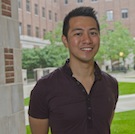 I am an assistant professor of archives at the University of Maryland College of Information Studies. I hold a Ph.D. in Information from the University of
Michigan School of Information. In addition to an MLIS from the University of the Philippines, I completed two certificates of graduate studies at Michigan,
one in Science, Technology, and Society (STS) and another in Museum Studies. My dissertation project examined virtual reunification - which I describe as a
process to put together physically dispersed collections to produce a consolidated digital representation - as a strategy to provide integrated access to
dispersed ethnographic archival images online. Out of the main findings of my dissertation project, I plan to identify common barriers to inter-institutional
collaboration for digitizing dispersed collections; build tools and creating online mechanisms that archives, libraries and museums can use to represent
and provide consolidated access to scattered image collections; and examine virtual reunification as a strategy for facilitating digital repatriation of
ethnographic image collections.
I am an assistant professor of archives at the University of Maryland College of Information Studies. I hold a Ph.D. in Information from the University of
Michigan School of Information. In addition to an MLIS from the University of the Philippines, I completed two certificates of graduate studies at Michigan,
one in Science, Technology, and Society (STS) and another in Museum Studies. My dissertation project examined virtual reunification - which I describe as a
process to put together physically dispersed collections to produce a consolidated digital representation - as a strategy to provide integrated access to
dispersed ethnographic archival images online. Out of the main findings of my dissertation project, I plan to identify common barriers to inter-institutional
collaboration for digitizing dispersed collections; build tools and creating online mechanisms that archives, libraries and museums can use to represent
and provide consolidated access to scattered image collections; and examine virtual reunification as a strategy for facilitating digital repatriation of
ethnographic image collections.
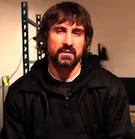 Gabby Resch is a PhD student at the Faculty of Information, University of Toronto. His research
focuses on human-computer interaction, embodiment, and digital media in institutional informal
learning environments. He has done research on augmented reality (his master’s research focused on
vision-based AR in science education, both formal and informal), 3D printing, and "making"
engagements in classrooms and museums. He has extensive experience with new media technologies, DIY
hacking/making culture, and the history of computing, and his work applies themes from these
respective areas to educational opportunities. He is a member of the ENCORE Lab, a research group
that investigates new ways of teaching and learning with technology, the Semaphore Lab, which is the
mobile and pervasive computing cluster of the Inclusive Design Institute, and the Critical Making
Lab, which opens up the practice of critical experimentation with embedded and material digital
technology - all at the University of Toronto.
Gabby Resch is a PhD student at the Faculty of Information, University of Toronto. His research
focuses on human-computer interaction, embodiment, and digital media in institutional informal
learning environments. He has done research on augmented reality (his master’s research focused on
vision-based AR in science education, both formal and informal), 3D printing, and "making"
engagements in classrooms and museums. He has extensive experience with new media technologies, DIY
hacking/making culture, and the history of computing, and his work applies themes from these
respective areas to educational opportunities. He is a member of the ENCORE Lab, a research group
that investigates new ways of teaching and learning with technology, the Semaphore Lab, which is the
mobile and pervasive computing cluster of the Inclusive Design Institute, and the Critical Making
Lab, which opens up the practice of critical experimentation with embedded and material digital
technology - all at the University of Toronto.
 Heather Ryan is a
Ph.D. student at the University of North Carolina at Chapel Hill, School of Information and Library
Science. Her research centers on digital preservation; specifically, on data-informed analysis of
file format endangerment. Through her research agenda she will develop methods that can be used to
effectively collect and analyze data that will help digital collection managers predict and plan for
the risks associated with digital file format endangerment. She managed two IMLS sponsored projects:
Closing the Digital Curation Gap (#LG-05-09-0040), and DigCCurr II (#RE-05-08-0060-08); and one NSF
supported project: Curating for Data Quality (NSF III #1247471). Ryan’s library and archives
work experience covers a broad spectrum of practice, from access services work in an academic
library to archives digitization and coding. Having worked in a heterogeneous set of libraries
performing in varying roles, she has a grounded perspective on practice that she brings to her
experiences with students and research collaborators. Her goal in teaching is to contextualize
library and archival research for the real-world use cases that information professionals will
experience in their working lives.
Heather Ryan is a
Ph.D. student at the University of North Carolina at Chapel Hill, School of Information and Library
Science. Her research centers on digital preservation; specifically, on data-informed analysis of
file format endangerment. Through her research agenda she will develop methods that can be used to
effectively collect and analyze data that will help digital collection managers predict and plan for
the risks associated with digital file format endangerment. She managed two IMLS sponsored projects:
Closing the Digital Curation Gap (#LG-05-09-0040), and DigCCurr II (#RE-05-08-0060-08); and one NSF
supported project: Curating for Data Quality (NSF III #1247471). Ryan’s library and archives
work experience covers a broad spectrum of practice, from access services work in an academic
library to archives digitization and coding. Having worked in a heterogeneous set of libraries
performing in varying roles, she has a grounded perspective on practice that she brings to her
experiences with students and research collaborators. Her goal in teaching is to contextualize
library and archival research for the real-world use cases that information professionals will
experience in their working lives.  Simone Sacchi is a doctoral student at the Graduate School of Library
Simone Sacchi is a doctoral student at the Graduate School of Libraryand In- formation Science (GSLIS), University of Illinois at Urbana–Champaign, and research assistant at the GSLIS Center for Informatics Research in Science and Scholarship (CIRSS). His research agenda lies at the intersection between the conceptual foundations of library, information, and computer science applied to data curation and digital preservation. He is interested in the representation, management and semantic enhancement of digital resources and how ontological modeling and conceptual analysis function as research methods in LIS. In par- ticular his current agenda focus on: modeling digital resources and ecosystems to support the development of digital curation infrastructure; applying semantic technologies to foster the use and reuse of digital resources in ongoing research and scholarship; enhancing data sharing and reuse via the Semantic Web and Linked Data architecture.
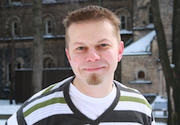 Mark Sedore is a first-year PhD student at the University of Toronto’s
Faculty of Information. He has master’s degrees in Communication & Culture (York and
Ryerson Universities) and Political Science (University of Toronto). His broad research
interests are in media and communication theory; specifically in medium theory (the Toronto School),
orality & literacy, and media censorship. His professional background includes
communication in the political and post-secondary education sectors.
Mark Sedore is a first-year PhD student at the University of Toronto’s
Faculty of Information. He has master’s degrees in Communication & Culture (York and
Ryerson Universities) and Political Science (University of Toronto). His broad research
interests are in media and communication theory; specifically in medium theory (the Toronto School),
orality & literacy, and media censorship. His professional background includes
communication in the political and post-secondary education sectors. Plato L. Smith II is currently a doctoral
candidate in Information Science at Florida State University (FSU) College of Communication &
Information (CCI) and also a teaching assistant (TA) at FSU's Program in Interdisciplinary Computing
(PIC). His research interests include exploration of some aspects of research data management such
as data curation, digital curation, and digital preservation practices and standards across
organizations, institutions, and disciplines. Smith was department head of FSU’s Digital
Library Center at Strozier Library from 2005-2012. He holds a master’s degree in information
science and a bachelor’s in computer information systems from North Carolina Central
University as well as a bachelor’s in marketing from North Carolina A&T State
University.
Plato L. Smith II is currently a doctoral
candidate in Information Science at Florida State University (FSU) College of Communication &
Information (CCI) and also a teaching assistant (TA) at FSU's Program in Interdisciplinary Computing
(PIC). His research interests include exploration of some aspects of research data management such
as data curation, digital curation, and digital preservation practices and standards across
organizations, institutions, and disciplines. Smith was department head of FSU’s Digital
Library Center at Strozier Library from 2005-2012. He holds a master’s degree in information
science and a bachelor’s in computer information systems from North Carolina Central
University as well as a bachelor’s in marketing from North Carolina A&T State
University.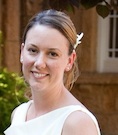 Jennifer Stevenson is in her first year of doctoral study at the University of
Wisconsin-Milwaukee. She graduated with an MLIS and a concentration in Archival Studies in December 2010.
She then went on to receive a Certificate of Advanced Study in Digital Libraries. Her research interests are invested digital
archives, new and social media, and user studies and archival software development. She is interested in information retrieval
and the social impacts of information and communication technology amongst different user groups. Professionally, she has been
working in the world of digital archives. Over the past several years she has worked at several institutions as a digital
archivist consultant.
Todd Suomela is currently working as a PhD student at
the University of Tennessee, School of Information Science. His major research interest is
citizen science, the recruitment of non-scientists to assist scientists with data collection and
data analysis. The benefits of this research are improving communication between scientists
and the public leading to greater public awareness of science. Prior to joining the PhD
program Todd completed a master's degree in information science at the University of Michigan and a
bachelor's degree in philosophy and English at Yale University. He also worked for 10 years in
the information technology industry.
Jennifer Stevenson is in her first year of doctoral study at the University of
Wisconsin-Milwaukee. She graduated with an MLIS and a concentration in Archival Studies in December 2010.
She then went on to receive a Certificate of Advanced Study in Digital Libraries. Her research interests are invested digital
archives, new and social media, and user studies and archival software development. She is interested in information retrieval
and the social impacts of information and communication technology amongst different user groups. Professionally, she has been
working in the world of digital archives. Over the past several years she has worked at several institutions as a digital
archivist consultant.
Todd Suomela is currently working as a PhD student at
the University of Tennessee, School of Information Science. His major research interest is
citizen science, the recruitment of non-scientists to assist scientists with data collection and
data analysis. The benefits of this research are improving communication between scientists
and the public leading to greater public awareness of science. Prior to joining the PhD
program Todd completed a master's degree in information science at the University of Michigan and a
bachelor's degree in philosophy and English at Yale University. He also worked for 10 years in
the information technology industry. Bedrich Vychodil: I am a PhD student at the Institute of
Information Studies and Librarianship, Faculty of Arts, Charles University in Prague. My
specific field of research is “Digital Image Production and Quality Control”, which
includes developing a new quality control application, design digitization workflow, digitization,
stillimage formats, standards, file format compression, file format migration, JPEG 2000
implementation and profile recommendations, long-term management, file format robustness, life-cycle
management, digital curation, etc. I have successfully passed all exams and recently finished
my doctoral dissertation. While studying, I have also been working at the National Library of the
Czech Republic in Prague (NLCR) as a professional Librarian in the Digital Preservation
Strategy Department. In 2010 I was promoted to Head of the Preservation Standards Department at
NLCR. Last year, I started a project called DIFFER (Determinator of Image File Format propERties).
This project’s approach is to develop an open source quality control application for still
image file formats capable of performing identification, characterization, validation and
visual/mathematical comparison, integrated into an operational digital preservation framework.
The application is equipped with a well-structured and uniform GUI, which helps the user to
understand the relationships between various file format properties, detect visual and non-visual
errors, implementing image similarity metrics and simplifies decision-making. An additional
feature called compliance-check is designed to help check required specifications of the JPEG2000
file format. I am proud of my team for being recognized by Google’s prestigious “Google
Summer of Code 2012”. Since April of last year, I have been an official member of the Google
Books Library Project Working Group as a technical adviser on image file formats, processes
settings and quality assurance. In addition, I have recently become a key member of a new
institutional research and development project called eDEPOSIT within NLCR focusing on eBooks and
born digital books.
Bedrich Vychodil: I am a PhD student at the Institute of
Information Studies and Librarianship, Faculty of Arts, Charles University in Prague. My
specific field of research is “Digital Image Production and Quality Control”, which
includes developing a new quality control application, design digitization workflow, digitization,
stillimage formats, standards, file format compression, file format migration, JPEG 2000
implementation and profile recommendations, long-term management, file format robustness, life-cycle
management, digital curation, etc. I have successfully passed all exams and recently finished
my doctoral dissertation. While studying, I have also been working at the National Library of the
Czech Republic in Prague (NLCR) as a professional Librarian in the Digital Preservation
Strategy Department. In 2010 I was promoted to Head of the Preservation Standards Department at
NLCR. Last year, I started a project called DIFFER (Determinator of Image File Format propERties).
This project’s approach is to develop an open source quality control application for still
image file formats capable of performing identification, characterization, validation and
visual/mathematical comparison, integrated into an operational digital preservation framework.
The application is equipped with a well-structured and uniform GUI, which helps the user to
understand the relationships between various file format properties, detect visual and non-visual
errors, implementing image similarity metrics and simplifies decision-making. An additional
feature called compliance-check is designed to help check required specifications of the JPEG2000
file format. I am proud of my team for being recognized by Google’s prestigious “Google
Summer of Code 2012”. Since April of last year, I have been an official member of the Google
Books Library Project Working Group as a technical adviser on image file formats, processes
settings and quality assurance. In addition, I have recently become a key member of a new
institutional research and development project called eDEPOSIT within NLCR focusing on eBooks and
born digital books. Eliot Wilczek: I am a doctoral candidate in the Graduate School of Library and Information Science at Simmons College. I hold an MS in library and information science with an archives concentration and an MA in history from Simmons. I served as an adjunct instructor at GSLIS Simmons from 2005 through 2010, teaching archives and records management courses. I currently serve as the University Records Manager for Tufts University.
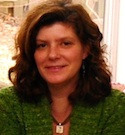 Heather Willever-Farr is a fourth-year doctoral
student at the School of Information Science and Technology at Drexel University. As a scholar, I am
interested in extending participatory models of archival practice by developing knowledge of
community-based archiving and collective memory creation on the web. My dissertation research
focuses on web-based communities that collaboratively build online archives for public consumption,
with a specific focus on family history researchers’ (FHRs) and amateur historians’
collaborative archiving activities. On a myriad of collaborative archiving websites, FHRs and other
amateur historians upload historically-rich primary materials that are worthy of long-term
preservation. Understanding and engaging with these online communities is important for memory
institutions if they hope to have a role in the long-term preservation of community-built archives.
To develop an understanding of these communities, I study both the social and technical dimensions
of collaborative archiving websites, including studying the online artifacts produced by website
contributors, the systems that support these production activities, and website contributors'
experiences with collaborative work. My research has implications for archival participatory and
curatorial practice, and provides a foundation for the design of systems that support archives users
as consumers and producers of historical materials. In addition to my research work, I am an online
instructor for Drexel, having taught archival studies and healthcare informatics courses for the
past three years. Previously, I managed the American College of Physicians' archives and records
management program, and served as the State of Indiana Electronic Records Archivist and the head of
the State of Indiana's records management program. I also served as a project archivist at the
Historical Society of Pennsylvania, the University of Wisconsin Archives, and the History Division
of the National Library of Medicine.
Heather Willever-Farr is a fourth-year doctoral
student at the School of Information Science and Technology at Drexel University. As a scholar, I am
interested in extending participatory models of archival practice by developing knowledge of
community-based archiving and collective memory creation on the web. My dissertation research
focuses on web-based communities that collaboratively build online archives for public consumption,
with a specific focus on family history researchers’ (FHRs) and amateur historians’
collaborative archiving activities. On a myriad of collaborative archiving websites, FHRs and other
amateur historians upload historically-rich primary materials that are worthy of long-term
preservation. Understanding and engaging with these online communities is important for memory
institutions if they hope to have a role in the long-term preservation of community-built archives.
To develop an understanding of these communities, I study both the social and technical dimensions
of collaborative archiving websites, including studying the online artifacts produced by website
contributors, the systems that support these production activities, and website contributors'
experiences with collaborative work. My research has implications for archival participatory and
curatorial practice, and provides a foundation for the design of systems that support archives users
as consumers and producers of historical materials. In addition to my research work, I am an online
instructor for Drexel, having taught archival studies and healthcare informatics courses for the
past three years. Previously, I managed the American College of Physicians' archives and records
management program, and served as the State of Indiana Electronic Records Archivist and the head of
the State of Indiana's records management program. I also served as a project archivist at the
Historical Society of Pennsylvania, the University of Wisconsin Archives, and the History Division
of the National Library of Medicine.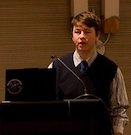 Laura Wynholds is a doctoral candidate in the Information
Studies department at UCLA. Research interests include: science and technology studies, data
practices, social and historical aspects of data structures, scholarly communication, open-access,
gender and sexuality studies.
Laura Wynholds is a doctoral candidate in the Information
Studies department at UCLA. Research interests include: science and technology studies, data
practices, social and historical aspects of data structures, scholarly communication, open-access,
gender and sexuality studies. Ayoung Yoon is a third-year
doctoral student at the School of Information and Library Science, University of North Carolina at
Chapel Hill. Her research interests include users’ trust in data and data repositories, data
curation, and personal digital archiving on the Web. She has an MSI in both preservation and
archives and record management from the University of Michigan School of Information, and BA in
history from Ewha Womans University, South Korea. She is currently a Carolina Digital Curation
(DigCCur) Doctoral Fellow.
Ayoung Yoon is a third-year
doctoral student at the School of Information and Library Science, University of North Carolina at
Chapel Hill. Her research interests include users’ trust in data and data repositories, data
curation, and personal digital archiving on the Web. She has an MSI in both preservation and
archives and record management from the University of Michigan School of Information, and BA in
history from Ewha Womans University, South Korea. She is currently a Carolina Digital Curation
(DigCCur) Doctoral Fellow. 